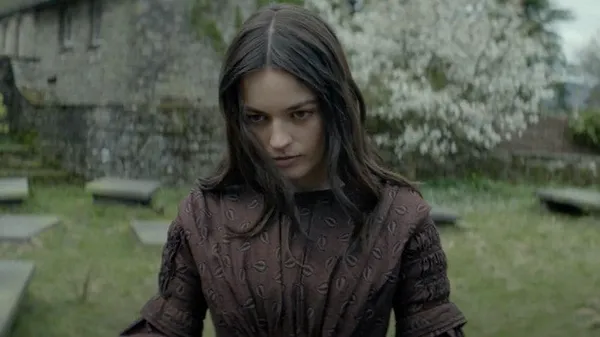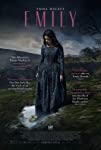Eye For Film >> Movies >> Emily (2022) Film Review
Emily
Reviewed by: Jennie Kermode

What is it that persuades people that those works of art and literature accorded great must perforce have some inspiration beyond the imaginations of their creators? “There must be something,” insists Anne Brontë, clutching the sweaty hand of the sister she knows to be dying. Perhaps it is jealousy – in this fictionalised take on the sisters’ lives she is not yet an author herself – but it seems rather that she simply cannot countenance Wuthering Heights having sprung from the mind of a person who has not known romantic love. This rather belittles Emily’s talent – and yet, as this is fiction, one might as easily read it as a comment upon Anne’s needs and imaginings, or upon Charlotte’s efforts to redefine Emily’s life after her death.
Whatever is the case, it cannot be denied that writer/director Frances O’Connor has captured something of the vital spirit found in Emily’s surviving writing, and frequently attested to by the few people who knew her. Given her predilection for fantasy and for reimagining herself, one suspects that she would have sympathised with the result. Emma Mackey, best known for her work in the television series Sex Education, conjures up a remarkable resemblance to Emily as she was painted by her brother Branwell, with that arresting glare which spoke of her discomfort in the world. She is also a head taller than the actors playing her sisters, which immediately makes her look awkward, too easily the subject of stares and whispers, too little able to attain that longed-for privacy. In a world where women were frequently shut away it was Emily’s misfortune to be poked and prodded into going out when she did not want to – except to the moors, which captured here in their stark beauty, if not in the full of their wildness.

As you may well have guessed, this film is framed around a romance between Emily and an uncomfortable object of desire – William, a preacher from the gentler country to the south, not used to such a hard land and not at all ready for her. Commissioned by her father to teach her French, he emerges at first as yet another force intended to constrain her will, to shape her mind and limit time spent in wandering or dreaming. Drawing perhaps upon the Brontës’ book collection for inspiration, O’Connor portrays Branwell, just a year her senior, as her closest confidante and also as a committed Romantic, rebelling against the strict order he saw all about him through drink, drugs, lechery and imitative poetry. We see Emily’s spirit set afire by the iconoclastic ideas which he presents her with, though she soon realises that he is not going to make anything of them. Armed with these, she looks everywhere for an opponent capable of standing against her in intellectual debate, and finds one in William.
The lure of the forbidden is a powerful thing. For some people, destructive love is even more so. This film is, as you might expect, riven with references to Wuthering Heights, though it is Emily’s fists beating helplessly against a closed door as she shivers and begs for entry that will stay with you. Again and again, hers is the face at the window, observing life from a distance. O’Connor has the subtlety to shift her tone without diluting the passion of it all, however. The first real love scene is almost comical as the lovers must spend an inordinate amount of time removing layer upon later of very formal, handsomely yet inconsiderately designed clothing. Elsewhere, brief glances are sufficient to convey a rising tide of passion – and guilt.
As William, Oliver Jackson-Cohen, who bears a curious resemblance to the young Christopher Lee, evinces very effectively the torture of a man of God swept away by words which some part of him recognises as near divine and which, in consequence, he is compelled to perceive as a trap. This is a man who perceives his own failings all too clearly even as he repeats them, endeavouring to hide behind the privilege of his status and his gender, flimsy things in the face of Emily’s brusque realism and enchanted dreaming. He is a weak man, selfish and flawed as all of Emily’s characters would be, and much more interesting because of it. Whilst it is easy to read her as strong in comparison, she is temperamental and, at times, appears to be prey to her own shifting moods, self-destructive when there is no-one else around capable of doing the job for her.
Screen adaptations of Wuthering Heights and Jane Eyre have tended to portray the Yorkshire landscape with great sweeping vistas, positioning its emptiness as a landscape of possibility and freedom. O’Connor does this relatively little; for the most part, we are down in the valleys where low stone houses huddle away from the storms. Windows look out at grassy slopes, at foreshortened horizons. The grass is thin; there is dirt everywhere, and endless drudgery involved in keeping it at bay, with which Emily is frequently occupied (as she was in life). This is no country for tall poppies. At what might be Emily’s moment of triumph, the smallness of her father’s ambition brings it all back down to size. O’Connor does not fall for the myth of a romantic place which breeds talent. Instead she recognises the pressure cooker effect of a tightly constrained world. Passion bursts out when all there is is freedom of thought; and sometimes it falls upon stony ground, and sometimes it alights upon the page.
Whatever else she might have dreamed or done, Emily’s life was restricted and short. With dazzling confidence and vision of her own, O’Connor grants her moments of true freedom in the imaginary.
Reviewed on: 16 Nov 2022
















